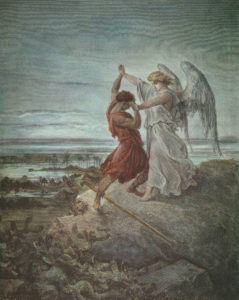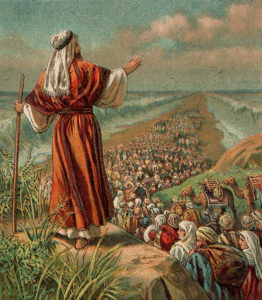Who are the Jews?
Lesson 3
Who are the Jews?
Learning Objectives:
At the end of this lesson, you should be able to:
- Articulate the special bond between God and the Jewish people.
- Explain Jewish peoplehood.
- Express your understanding of the uniqueness of the Jewish people.
Before You Begin:
- Pray for a deepened understanding of what makes the Jewish people important to God and unique in the world.
Part I: The Covenant
In this lesson, we are going to learn about the Jewish people: how they entered into a covenant with God and how they became a unique people with a shared destiny. We’re going to begin where we always should: Scripture.
Activity: Text Study
You will need a Bible for this activity. Look up the following passages to better understand the Lord’s covenant with Abraham and the Jewish people, and how that applies today.
Think it over:
- What happens in these verses?
- What does the Lord promise Abram?
- What must Abram do in return?
By engaging in this vital act of faith, by leaving his home, his family, his idols and all that he has ever known to follow God’s will, Abram and his descendants enter into a completely singular relationship with God. They become His chosen people through whom He would initiate a covenant relationship, thereby demonstrating His faithfulness and character to the world. In following God’s command, and demonstrating his faith, Abram becomes the father of the Jewish people.
A covenant is a solemn agreement between parties. In this case, the covenant is not just between God and Abram, but between God, Abram, and all of Abram’s descendants.
In the Ancient Near East, it was common for two people to make a covenant by cutting animals in half, splitting the halves, and then walking in between the pieces to make an oath. By walking between the split animals, each person was swearing that if they broke their part of the agreement, they would meet the same end as the sacrificed animal. However, in Genesis 15, only One party walks through the pieces: God Himself, in the form of a “smoking oven and a flaming torch” (Genesis 15:17).
What does this mean? It signifies that God alone took responsibility for fulfilling the covenant. It was as if God made a contract in which He promised certain benefits to Abraham namely, a land, blessing, and descendants without any stipulations to be upheld by Abraham. In other words, God made an unconditional and irrevocable covenant with Himself concerning the Jewish people (c.f. Hebrews 6:13-18).
DID YOU KNOW?
Modern-day covenants abound. For example, companies make financial covenants, or agreements, in return for loans, and the recipients agree to certain terms to receive a loan. When two people get married, they enter into a marriage covenant, promising to love each other, care for each other, etc. Countries can even make covenants with each other, pledging to be at peace, to maintain certain geographical boundaries, etc.
The covenant, while first expressed in the verses we just read, becomes actualized in Genesis 17, when Abram and the men of his household agree to and perform ritual circumcision on their household. Let’s review the Scripture.
Activity: Text Study
Read: Genesis 17:1-27 (Excerpt One, found at the end of this lesson)
Talk about it:
- What promises does God make to Abram?
- What must Abram do to fulfill God’s commandment?
- Who is Sarai? What is her role in the covenant?
- Who is Isaac? What is his role in the covenant?
- What is Ishmael’s role?

Jacob wrestling with an angel. Photo credit: Wikimedia Commons.
By entering into a covenant with God, Abram, Sarai, and their descendants are set apart. Abram becomes Abraham, “father of many.” Sarai becomes Sarah, “princess.” The two have a son in their old age, Isaac. By doing God’s will, Abraham and his family are promised many blessings: they will become a great and fruitful nation, and God will give them the Land of Canaan, a land to be their own forever. Ishmael, Abraham’s son by Sarah’s maidservant, and his descendants will be blessed, but they are not to inherit Canaan or receive the special status that God gives to Isaac’s line. Instead, the covenant is to be passed down from Isaac to his son Jacob.
It is from Jacob that we first see the name “Israel.” In Genesis 32, Jacob wrestles with an angel from God. He becomes known as “Israel, one who wrestles with God.” His descendants become known as the “Children of Israel,” and the land of their inheritance, Canaan, becomes known as the Land of Israel.
Meet: Ishmael
Genesis says that Ishmael, after settling in Paran, took a wife and became the father of twelve sons who became twelve nations (21:20-21; 25:12-18). Interestingly, later in Genesis, we learn that Ishmaelites are those to whom Joseph’s brothers sold him into slavery (37:25-36). Today, since the birth of Islam through Mohammed in 600 AD, some Muslims believe that it was Ishmael whom Abraham offered on the altar (c.f. Genesis 22, although the child is not mentioned by name in the Qur’an), not Isaac, and that Ishmael was the child of the promise, not Isaac.
Part II: The People
We’ve just learned that the Children of Israel, the Jewish people, are set apart by God, with a special covenant and relationship to Him.
Jeremiah 31:35-37 says that the Jewish people will not cease being a nation before God unless the sun, moon, and stars cease – in other words, forever! While the Hittites, Amorites, Perizzites, and many other nations of the Bible have long since assimilated into the milieu of modern nations, the Jewish people remain, speaking the same language, following many of the same customs, and worshipping the same God as in the biblical record.
Notably, the covenant was made not just with Abraham, Isaac and Jacob, but with their descendants. This is unique in the world: the Jewish people as a group have been set apart to receive God’s blessings and keep his Commandments. The covenant, and its expression, is communal. For instance, in order to pray at certain times in the synagogue, there must be a quorum, a specific number of Jewish adults, present. Additionally, almost all Jewish prayer is said in plural language, reflecting the nature of their covenant with God.
In the Christian faith, individuals make their own covenants with God; they form a distinct, personal relationship. Christians join together in prayer and worship in churches, but the expression of faith is a personal one, with communal elements.
Since the covenant was made not just with Abram, but with all his descendants, who today are known as the Jewish people, we should take time to learn what it means to be a part of that “people.”
Categorizing Jewish Peoplehood

Israel’s Exodus from Egypt. Photo credit: Wikimedia Commons.
Being Jewish means much more than belonging to a religious group. In fact, you can be religious or secular and still be Jewish. Essentially, the Jewish people are made up of a group of individuals who share a common identity. That identity is made up of key aspects, including: religion, collective memory, connection to land, and language.
The Exodus from Egypt is an example of collective memory, and it is commemorated each year in the holiday Passover. Scripture tells us that when the Israelites were enslaved in Egypt, God orchestrated ten plagues through the prophet Moses upon the Egyptians for refusing to let His people–the Jews–leave to worship Him. The last plague, and the most chilling, was the death of every firstborn in Egypt–except the Israelites’ to whom God gave special instructions to protect them from being smitten.
One of three ancient festivals in which Jews were commanded to make a pilgrimage to Jerusalem, Passover has been centered in the home since the destruction of the Second Temple. Jewish families gather to take a core ritual meal, called the seder, laden with religious symbolism.
The Haggadah, one of the key elements of the Jewish Passover seder, features as one of the last prayers “L’shana haba b’Yerushalayim,” or “Next year in Jerusalem.” These words have resonated with meaning throughout the exile and hold even more meaning now that the Jewish people have a State of their own.
Activity: Text Study
Think it over:
- What types of shared experiences do Jews have?
- What is different between being Jewish from your experience as a Christian? What is the same?
Define it:
- Religion: the way that someone expresses or worships God.
- Collective memory: how certain groups express or identify with the events that make up their narrative.
- Connection to land: having a distinct place that a group belongs to, or thinks of as their own.
- Language: having a shared way of speaking to each other, unique to the group.
In modern times, this Jewish identity is often fused with other identities people develop based on where they live, the social groups with which they associate, and more. There are Irish Jews, Mexican Jews, South African Jews, and American Jews, yet all Jews have a shared membership in the people, with a shared destiny that developed from Abraham’s covenant with God. This covenant forms the basis of the Jewish people. It gave them a homeland, Israel, and kept the Jewish people together through 2,000 years of exile from that land. The Jewish people are unique in the world.
FURTHER STUDY AND REFLECTION
Read: “Abraham: Our Father”
To enhance your understanding of Abraham and his story, you can review the following passages: Genesis 12-13, Genesis 15, Genesis 17, Genesis 22.
Journal it out:
Write a short response to the following prompt:
Abraham was a man of faith and action whose belief in God shaped the entire Western world. Think of a time when you had to keep faith with God. What did you do? How did you face your test? How could the story of Abraham inspire you in the future?
Text Sheets
Excerpt One:
Genesis 17:1-27
When Abram was ninety-nine years old, the LORD appeared to him and said, “I am God Almighty; walk before me faithfully and be blameless. 2 Then I will make my covenant between me and you and will greatly increase your numbers.” 3 Abram fell facedown, and God said to him, 4 “As for me, this is my covenant with you: You will be the father of many nations. 5 No longer will you be called Abram; your name will be Abraham, for I have made you a father of many nations. 6 I will make you very fruitful; I will make nations of you, and kings will come from you. 7 I will establish my covenant as an everlasting covenant between me and you and your descendants after you for the generations to come, to be your God and the God of your descendants after you. 8 The whole land of Canaan, where you now reside as a foreigner, I will give as an everlasting possession to you and your descendants after you; and I will be their God.” 9 Then God said to Abraham, “As for you, you must keep my covenant, you and your descendants after you for the generations to come. 10 This is my covenant with you and your descendants after you, the covenant you are to keep: Every male among you shall be circumcised. 11 You are to undergo circumcision, and it will be the sign of the covenant between me and you. 12 For the generations to come every male among you who is eight days old must be circumcised, including those born in your household or bought with money from a foreigner—those who are not your offspring. 13 Whether born in your household or bought with your money, they must be circumcised. My covenant in your flesh is to be an everlasting covenant. 14 Any uncircumcised male, who has not been circumcised in the flesh, will be cut off from his people; he has broken my covenant.”
15 God also said to Abraham, “As for Sarai your wife, you are no longer to call her Sarai; her name will be Sarah. 16 I will bless her and will surely give you a son by her. I will bless her so that she will be the mother of nations; kings of peoples will come from her.”
17 Abraham fell facedown; he laughed and said to himself, “Will a son be born to a man a hundred years old? Will Sarah bear a child at the age of ninety?” 18 And Abraham said to God, “If only Ishmael might live under your blessing!”
19 Then God said, “Yes, but your wife Sarah will bear you a son, and you will call him Isaac. I will establish my covenant with him as an everlasting covenant for his descendants after him. 20 And as for Ishmael, I have heard you: I will surely bless him; I will make him fruitful and will greatly increase his numbers. He will be the father of twelve rulers, and I will make him into a great nation. 21 But my covenant I will establish with Isaac, whom Sarah will bear to you by this time next year.” 22 When he had finished speaking with Abraham, God went up from him.
23 On that very day Abraham took his son Ishmael and all those born in his household or bought with his money, every male in his household, and circumcised them, as God told him. 24 Abraham was ninety-nine years old when he was circumcised, 25 and his son Ishmael was thirteen; 26 Abraham and his son Ishmael were both circumcised on that very day. 27 And every male in Abraham’s household, including those born in his household or bought from a foreigner, was circumcised with him (New International Version, Genesis 17:1-27).
Read:
Abraham Our Father
In Jewish tradition, Abraham is often referred to as Avraham Aveinu, “Abraham our Father.” Abraham is the first of the three patriarchs of the Jewish people, followed by his son Isaac and grandson Jacob. It is Abraham who makes and seals the covenant between the Jewish people and God, securing the destiny of the Children of Israel for all time.
Readers of the Bible are in the dark regarding much of Abraham’s life, encountering him in Scripture when he is already middle aged. Over the course of Genesis, Abraham goes from obscurity to greatness, building a new life with Sarah his wife as his faith in God takes him on a desert trek, bringing him away from the idol-worshipping community of his past to establish the beginnings of the Jewish people and ultimately the Western World’s foundational values.
Abraham’s story is marked by danger; he and his family face hunger, abduction, and threats of violence as they travel throughout the ancient Middle East. And yet, over more than 100 years of traveling, Abraham keeps faith with the covenant he made with the Lord. Abraham’s faith and desire to serve God is tested again and again. Jewish tradition says that God tested Abraham ten times. His final test was the commandment to sacrifice Isaac, his beloved heir, on an altar where the Lord then sent an angel to stop him, as Abraham passed that test of obedience. In keeping faith with God and fulfilling his commandments, Abraham becomes an exemplar of core Jewish values, including love of God, love of one’s fellow man, commitment to family, and hospitality.
Abraham is an important figure in Christianity as well. Many Christians point to Romans 4.2-5, in which Paul lauds Abraham and emphasizes that it is Abraham’s faith in God, above even his actions, which set him apart as an example for all Christians. As Christians, we are grafted into this faith history, Romans 11:17.
_________
Pirkei Avot 5:4.
Genesis 22:1-19.
Define it:
Hebrews 11:1
Hebrews 11:1 describes faith as “the assurance of things hoped for, the conviction of things not seen.” In other words, to have faith is to be confident in something or someone, even if you haven’t received what was promised. Thus, we learn in Genesis 15 that Abraham had faith in God’s promise to make him a great nation, even though he was childless at the time.
Scripture Snapshot:
Romans 4:18-25
“Against all hope, Abraham in hope believed and so became the father of many nations, just as it had been said to him, “So shall your offspring be.” 19 Without weakening in his faith, he faced the fact that his body was as good as dead—since he was about a hundred years old—and that Sarah’s womb was also dead. 20 Yet he did not waver through unbelief regarding the promise of God, but was strengthened in his faith and gave glory to God, 21 being fully persuaded that God had power to do what he had promised. 22 This is why “it was credited to him as righteousness.” 23 The words “it was credited to him” were written not for him alone, 24 but also for us, to whom God will credit righteousness—for us who believe in him who raised Jesus our Lord from the dead. 25 He was delivered over to death for our sins and was raised to life for our justification.
